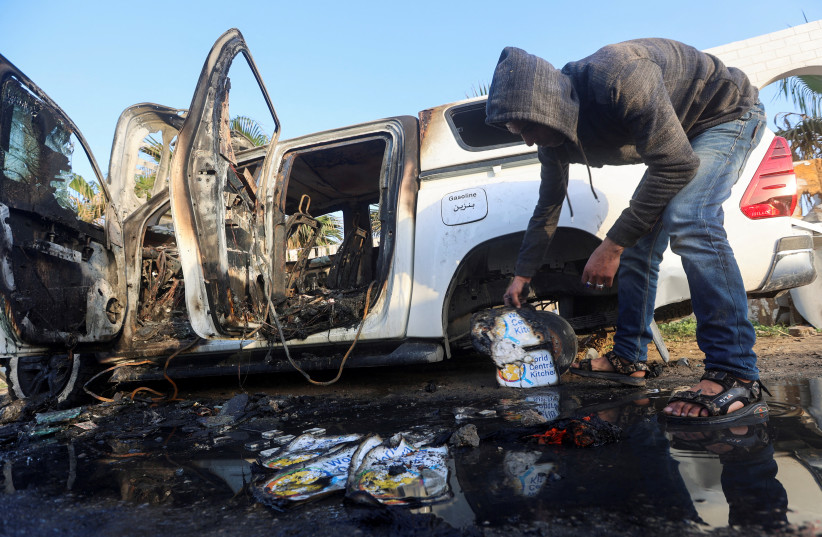In a heartfelt apology, IDF Chief of Staff Herzi Halevi addressed the terrible incident in which seven World Central Kitchen (WCK) staff members lost their lives, attributing it to a grievous misidentification under the veil of night amidst the complexities of war conditions. This incident sheds light on the unpredictable and often tragic nature of warfare, particularly in regions fraught with tension like Gaza.
Israel was delighted when the WCK offered to help feed Gaza. The neutral and private organization, which reportedly had delivered food to Israeli survivors of Hamas’s barbaric October 7 attack, had previous experience delivering meals in other dangerous places and was willing to get involved. WCK was welcomed, assisted, and coordinated with the IDF. They got off to a good start.
Then came the tragedy. A convoy of three vehicles containing seven passengers was hit by drone-fired missiles, resulting in the deaths of all. How could this deadly mistake happen?
Let’s begin by examining what is known about the occurrence of lethal errors in wartime. If you’re anything like me, the facts will break your heart.
One type of lethal error in wartime is “friendly fire,” when, for a variety of reasons, soldiers fire on their own, or on their allies. The regrettable shooting at the wrong target happens often enough to have earned a category of its own, with a sadly ironic name.

The "recency effect"
WHAT PSYCHOLOGISTS call “the recency effect” – giving too much weight to recent events – can distort one’s perception of reality and influence decision-making. This is especially true when making a split-second decision, as was the case in the hostage shooting.
Like soldiers, humanitarian workers on battlefields are at risk. One well-known case with characteristics similar to the WCK was the Médecins Sans Frontières (MSF) Hospital bombing in Kunduz, Afghanistan (2015):
On October 3, 2015, a United States Air Force AC-130 gunship attacked an MSF hospital in Kunduz, Afghanistan. The hospital was repeatedly bombed over the course of an hour, resulting in the deaths of at least 42 people, including medical staff and patients, and injuring dozens more. The attack was condemned by MSF and various international organizations as a grave violation of international humanitarian law. This incident was widely regarded as a tragic case of misidentification or accidental targeting. The hospital was clearly marked as a medical facility, and MSF repeatedly informed the US military of its coordinates. The attack was likely due to errors in intelligence or communication.
Why do these mistakes happen? Some psychological factors are at work.
Even when there is coordination and information from higher-ups, the soldier in the field has autonomy. This is generally true in the military, as it is in other fields, such as firefighting. It is essential to empower the people on the ground, closest to the rapidly changing reality, to be free to act. Nevertheless, there will be times when those people believe they have newer, credible information… which turns out to be wrong.
Gaza is a theater of illusions, in which an ambulance, which should be sacrosanct, is often used to transport armed personnel and weapons. The soldier on the ground must decide if the next ambulance is transporting wounded and sick people… or armed fighters. Many lives depend on the soldier’s decision, including his own.
One need hardly add that the stress levels of soldiers on the battlefield are off the charts, reducing the quality of their emotional regulation. Soldiers are trained to keep their emotions in check and make sound, rational decisions but those emotions are also data that help keep them and their buddies alive in a theater where things are often not what they seem.
The deaths of the WCK workers are yet another tragic result of this hateful war that Hamas began and the rest of us must finish. As we mourn the loss of these humanitarian workers, let us also reflect on the broader implications of their untimely deaths. They serve as a poignant call to all parties involved to reevaluate their strategies and ensure that the sanctity of humanitarian efforts is preserved even amidst the tumult of conflict. The tragedy that befell the WCK team is not just a loss for their loved ones, but a loss for humanity, reminding us of the urgent need to protect those who courageously venture into the heart of conflict to help others.
The writer is a psychologist and podcast host of The Van Leer Series on Ideas, available wherever you find your podcasts.
